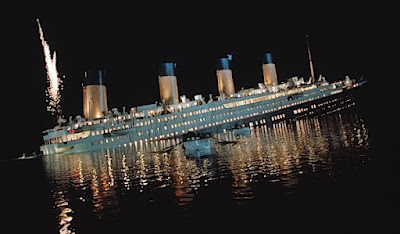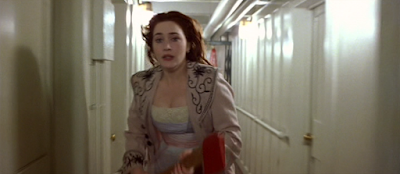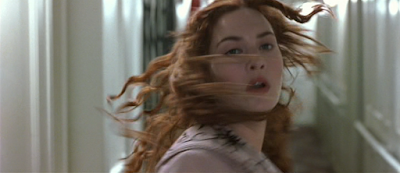All these years later the hubris still astounds me, that James Cameron not only made the most expensive movie of all time but that he made the most expensive movie of all time about the Titanic, the go-to metaphor for hubris. You’re just asking for it, at that point, and though it can be hard to remember given what happened, for a while it appeared that Cameron would be his own story’s J. Robert Ismay. The release date was pushed three times as Cameron struggled to cut and complete the eventual three hour and fourteen-minute film while the trades pulsed with stories of the production’s disasters. The budget swelled. Kate Winslet nearly drowned. While filming in Nova Scotia, an aggrieved party took his/her displeasure to the extreme by poisoning the crew’s clam chowder with PCP. Cameron never said it wasn’t about Titanic, it was Titanic, in the vein of Frances Ford Coppola talking about “Apocalypse Now” and Vietnam but I’m sure he must have thought it. And yet, Cameron ultimately succeeded not only by transforming the most expensive movie of all time into the most profitable movie of all time but in winning the Oscar for Best Director and Best Picture along the way, monoculture’s last great hurrah.
How did he do it? He made a good movie, of course, obviously, and he made a good movie despite the backlash always destined to accompany such an overwhelming success, the maddening ubiquity of Celine Dion’s “My Heart Will Go On,” the coded language of its box office success being attributed entirely to young girls, and the more recent preening punctiliousness about whether there was enough room for Jack to fit on the board with Rose at the end. Can I ask you a favor, reader, right up front? Is it ok if I don’t talk about the board? I am sick of talking about the board. There’s a scene in the movie when Old Rose is shown a CGI rendering of the sinking of the Titanic by a character who gets a little too giddy over the computer graphics. “Thank you for that fine forensic analysis,” Old Rose says, “of course, the experience of it was somewhat different.” If you want to talk about the board, if scientific nitpicking is how you prefer to consider works of art, fine, talk about it, but my experience of the movie was somewhat different.
Cameron has said he essentially wanted to make a movie of the Titanic simply, in a manner of speaking, so he could dive the wreck, which was first found by Robert Ballard in 1986 and planted the narrative seeds in the director’s mind in the first place, and he begins his epic by marrying that footage with a story of fortune hunters descending the 12,000 feet hoping to locate a priceless blue diamond called the Heart of the Ocean thought to be hidden amid the debris. All they find instead is a drawing of a young woman wearing those 56 carats, leading them to 101-year-old Rose Dawson (Gloria Stuart) who proceeds to spill her secrets, even as she keeps the biggest one, of the ship’s sinking and how it intertwines with her arranged marriage to Gilded Age psychopath Cal Hockley (Billy Zane) and a love affair with 3rd-class artist Jack Dawson (Leonardo DiCaprio) who helps her chart a course to personal freedom.
But if these present-day scenes are a framing device, not to mention a 20th Century Fox-funded dive to the most famous shipwreck in history, they are so much more, not merely a means of setting up the narrative but inducing atmosphere. It’s one to thing know, as so many people cheekily told me 25 years ago, that the boat sinks but it’s another to see the sunken boat, an image tempering every other image to come. In the exuberant sequence of the ocean liner heading out to sea, Cameron and his co-editors Conrad Buff IV and Richard A. Harris cut from the bridge to the turbine room to the boiler room to the bow of the ship and then proffer a special effected shot of the whole ship moving from bow to stern, reveling in this mammoth manmade machine even as the planted memory of seeing it at the bottom of the Atlantic lingers. When Jack punctuates the scene by hollering “I’m the king of the world,” he may as well be speaking on behalf of the masters of the universe.
But if these present-day scenes are a framing device, not to mention a 20th Century Fox-funded dive to the most famous shipwreck in history, they are so much more, not merely a means of setting up the narrative but inducing atmosphere. It’s one to thing know, as so many people cheekily told me 25 years ago, that the boat sinks but it’s another to see the sunken boat, an image tempering every other image to come. In the exuberant sequence of the ocean liner heading out to sea, Cameron and his co-editors Conrad Buff IV and Richard A. Harris cut from the bridge to the turbine room to the boiler room to the bow of the ship and then proffer a special effected shot of the whole ship moving from bow to stern, reveling in this mammoth manmade machine even as the planted memory of seeing it at the bottom of the Atlantic lingers. When Jack punctuates the scene by hollering “I’m the king of the world,” he may as well be speaking on behalf of the masters of the universe.
Cameron brought the White Star Line’s passenger liner back to life in those moments, as well as those when it goes under, through a combination of model work and motion capture imagery, recording the movement of real people and translating those recordings to computer animation, though the most stunning effect in “Titanic” is in a sense the most practical. Paradoxically conceived to ease some of pricey computer animation, Cameron constructed a 775-foot replica of one side of the ocean liner, built so it could be split into sections and tilt into the water for the sinking scenes and providing an extraordinary verisimilitude no computer-generated image could hope to conjure. Though Cameron is not exactly a visual lyricist, a simple shot of peering over a lifeboat looking at the carbon copy of the slanted ship is like being inside a waking dream, and a crane shot alongside the replicated ocean liner as it nears its final moments first captures the panic from a distance, James Horner’s synthesized choir imbuing the moment with an elegiac reverence, before the camera moves in toward the rail and back aboard the ship, plunging us into the desperate fury. Indeed, Cameron eschews a docudrama approach a la “A Night to Remember” for vintage Hollywood hokum making that fury palpable. A scene in which Jack races to beat the quickly rising water below deck by finding the key that will unlock a closed gate might be a shameless suspense-generating trope, but to use a phrase of the film’s, it counts, epitomized in Winslet’s quietly doleful “Hurry, Jack” as pure guttural dread.
If in the 100-plus years since its sinking the Titanic has emerged as go-to metaphor for hubris, so, too, has it emerged as a supreme allegory for class. After all, it’s right there in the delineations of the passenger list: 1st, 2nd, 3rd. There are hints of class struggle in Cameron’s version, but these tend toward the two-dimensional, like the glib cut from the steerage party to the business magnates discussing politics in the smoking room, inadvertently embodying the stereotype of the working class as unthinking. Later, during the sinking, Cameron briefly cuts to the steerage band leader crying out for help in the ocean, which comes across unnecessarily cruel, suggesting he and everyone else below decks were destined to die rather than arguing they did not have to die. But then, Cameron has always been less attuned to social strata through notions of wealth than sex, evinced in his gracing the macho 80s with screen warriors like Sarah Connor and (his version of) Ellen Ripley, and his “Titanic” becomes about the liberation of Rose.
One of the most frequent critiques of Cameron’s box office behemoth was the woebegone dialogue, valid if unfortunate because while many of the lines clunk, just as many were unnecessary; subtract the feeble verbiage and “Titanic” would work as a silent movie. You don’t need Cal’s braying about what the Heart of the Ocean signifies because the image alone in conjunction with Rose’s stricken face evoke her role as his possession, just as the way Jack eventually draws her in the nude wearing only the blue diamond suggests her resistance, the drawing scene itself casting Rose as Botticelli’s Birth of Venus, emblematically triggering the sinking as much as the iceberg. Jack’s refusing to let go of Rose’s hand when she falls off the stern in their introductory scene connects to when she’s forced to let his hand go in the freezing north Atlantic, putting a dramatic point on how even as he helps free her, she ultimately must rescue herself. In the movie’s the most thrilling sequence (that I once broke down in a mere 122 screen shots), in fact, Rose rescues Jack rather than vice-versa, punching the patriarchy squarely in the face along the way (“Listen!” she screams, one word that is the movie’s best because it summarizes someone who’s never been heard), and grabbing the axe in the most thrilling crossing the threshold of the hero’s journey I can recall, showing both her determination and desperation, someone who is growing up before our very eyes and scared to death, not a still image like a cinematic painting but a moving picture, one epitomizing the physicality of Winslet’s performance, doing everything DiCaprio is doing but in a dress and heels.
“Titanic” is Rose’s movie, and by extension Winslet’s movie too, but it’s also the movie that made DiCaprio a full-fledged star. That by some accounts he didn’t really want to do the movie, and didn’t really enjoy the experience of making the movie, is wicked irony because more than most of his performances, he feels less mannered and more at ease, his most Movie Star performance (which I have written about before). But if “Titanic” also belongs to Leo, it also belongs to Kate and Leo, less a cute sobriquet than a full-blown phenomenon, an emblem for true and timeless love, evinced in how they – I mean, it – gets quoted in Richard Curtis’s “Love Actually” like a lodestar. What is it about Kate and Leo that makes, nay, makes me, get all googly-eyed every time I see them together at awards shows smiling and laughing? I think it’s because their romance in “Titanic” was consciously written and performed as a youthful one, giggly, and goofy. When Jack teaches Rose to spit, or when they are dancing below deck, or evading Cal’s haughty valet (David Warner) and virtually falling into one another with laughter, it’s an astonishing expression not just of the first flush of infatuation but a kind of innocence that can only exist at that age, and that takes on a greater scope given the backdrop, as something found and then lost, neatly captured by Cameron in the early moment when old Rose closes her eyes and for a just an instant we see Jack, before we even know who he is, the golden hues of the past a jarring contrast to the cold blue of the present.
This youthful sensation caused some describe “Titanic” as Romeo & Juliet on a boat; that’s how Cameron first pitched his epic to 20th Century Fox. But that has never felt right to me. There are tragic elements to “Titanic,” obviously, it’s the Titanic, but Cameron’s film is less a classical tragedy in the vein of Shakespeare’s than an emotional melodrama. That word, melodrama, somewhere along the line became a dirty one in a movie industry that became obsessed with authenticity and grittiness, but Cameron, bless his heart, leans right into it, heightening every emotion and sensation, which is why even Zane’s performance, running on a different RPM than everyone else’s, like he should be accompanied by a theatre organ, fits. And it’s why “Titanic” craved such a profound, lasting effect on so many, including me, because it brilliantly raises its emotions by reducing them to their most elemental level. You see it clear as day in the movie’s most famous scene, when Rose finds Jack at the bow and starts to say something and he quiets her, almost a cosmic muffling of the bad dialogue, brings her up onto the railing, and they fly. In this moment, he sings her a bit of Come Josephine in My Flying Machine, because it was a popular tune of the era though it also makes me think of Roger Ebert’s line about movies as machines for generating empathy and how Cameron’s movie is like a machine for generating emotion, one that a quarter-century later still hits the moon.



































































































































